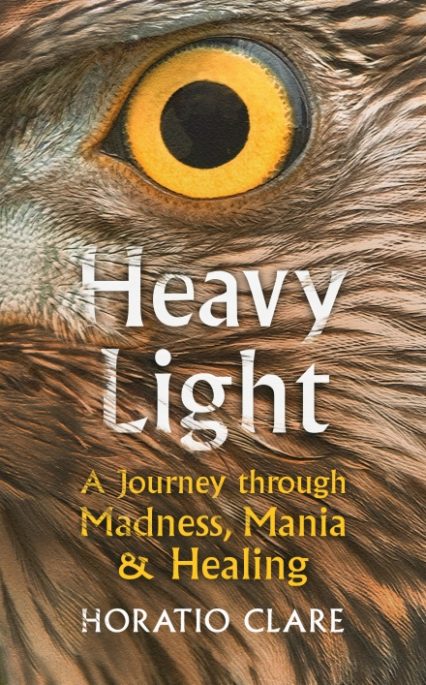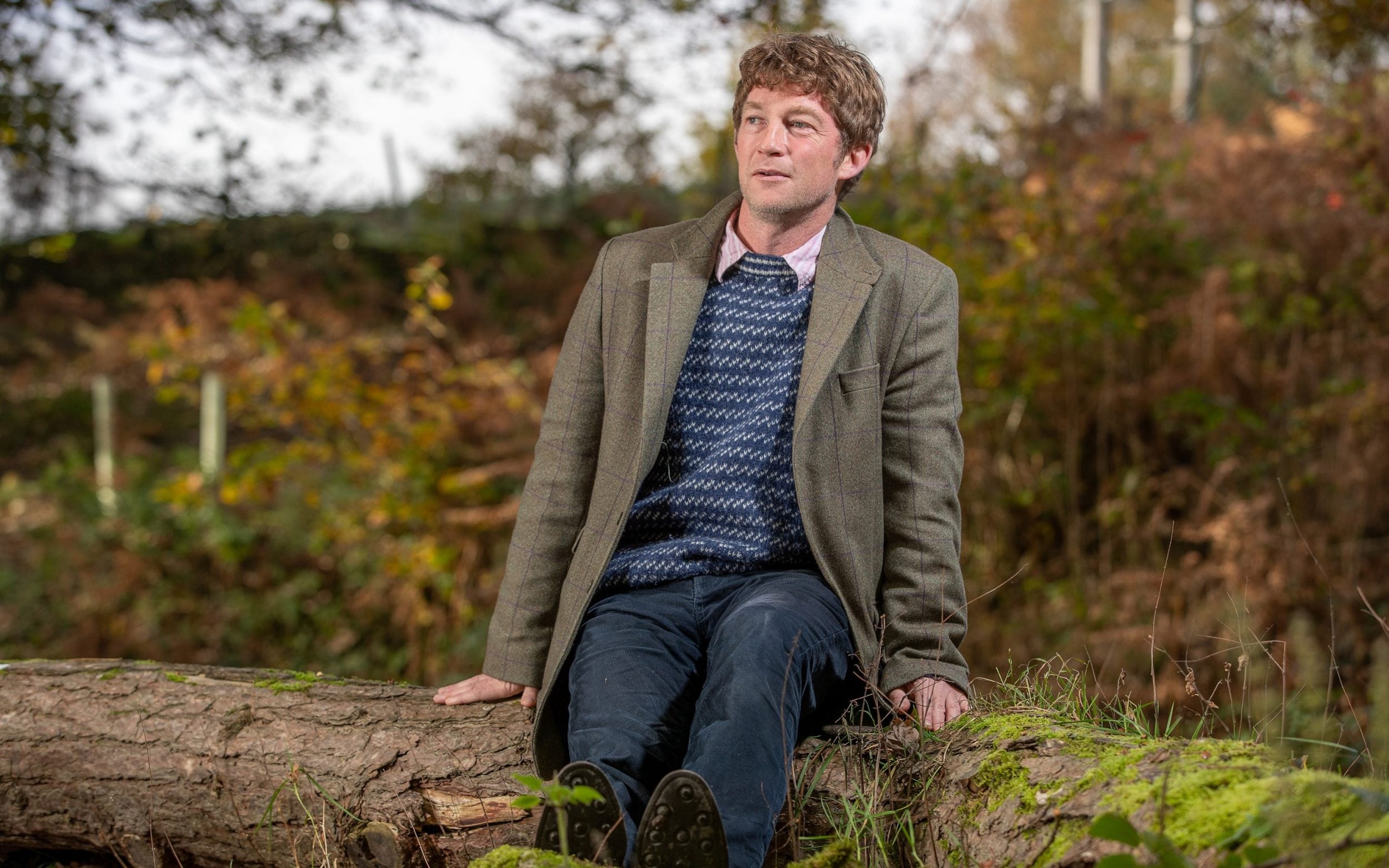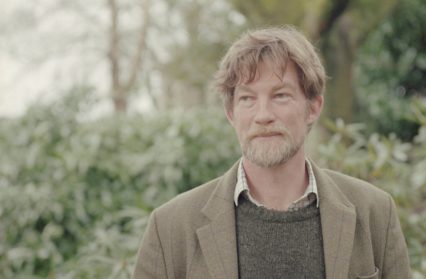In 2018, Horatio Clare suffered a manic breakdown while on a family holiday in Italy. His new book, Heavy Light: A Journey Through Madness, Mania and Healing, charts the journey from sickness to treatment with Clare’s characteristic wit and charm. Here, Gary Raymond caught up with him via zoom to discuss the challenges of laying bare in a bold and brilliant book.
Gary Raymond: I suppose the usually benign opening of how are you is a little more loaded than it might have been on previous book promotions?
Horatio Clare: Yes. It’s not quite the same. But that’s good. It’s been really interesting. I mean, I was pretty intimidated to start with. People have been really generous and sensitive, and a lot of journalists have told me their own stories. It does seem a fairly universal field, if not in the details. But yeah, it’s been good.
Gary Raymond: Reading Heavy Light and thinking of the timeline of events, I’ve been thinking of the first time we met, which I think was at the Cardiff Book Festival in 2017.
Horatio Clare: Yeah. It was on that roof at the Angel Hotel.
Gary Raymond: I remember you’d just come back from Africa writing a piece for the Financial Times. I was about to go on stage to interview somebody, and you were inviting me to the NCP to try the Madagascan rum you had stashed in the boot of your car. I regretfully had to take a rain check, but looking back now, was that a period leading up to the events depicted in the book?
Horatio Clare: Yeah, that was because I was basically having seasonal highs, much exacerbated by rum and then marijuana. And then every Christmas I’d have spent all the money – my poor family. It would be dark. I’d be miserable. And then down I’d come crashing. There was no mystery to it. It was just incredibly childish. A year later it really got out of hand.
Gary Raymond: And you’re in a good place now?
Horatio Clare: It’s been a lovely two years actually, because lockdown here was actually a very healthy, wonderful experience. Lots of walking on the moors, loads of time with my boy and Rebecca. We became very close and calm. I try to avoid spirits, I completely avoid drugs. I go weeks at a time without a drink, and it just feels like a kind of maturity that I’d been avoiding for a long time.
After being sectioned, you do feel there’s definitely a before and after. You can’t repeat the same patterns because you know what will happen. And because technically I’m “non-compliant”, and have been prescribed long-term antipsychotics, if I don’t take them, and then end up going mad again, I’d be onto section number three. That would mean, you know, six months – renewable indefinitely – which is quite a powerful motivating factor. But I don’t fear it because I don’t see any mystery in its causes or its rhythms. And sure enough, my therapist said, you will definitely be higher, happier in the summer and definitely more miserable in the winter. That’s you, mate. And that is me. But that’s fine, it’s also most people I know.

Gary Raymond: You’ve already said twice that there’s no mystery to it. I think that’s quite interesting. The first half of the book is this kind of really fast-paced, almost John Buchan-like adventure which has these meta moments where you take a step back, and you talk about Rebecca’s reflections on the events depicted in it and things like that. But then the second half is more analytical in that you break things down a lot more.
Horatio Clare: The most frightening thing about unhappiness or trauma or illness of any kind, but certainly in the mental realm, is the feeling that you don’t know what’s going on. And that leads to a really understandable wish to just get something that will fix it. But the thing is, that has been fairly one-dimensional, built on this myth that there’s an imbalance in the brain of a depressed person. No one’s ever been able to show that; in fact, I believe there was a court case in America, filed by the anti-psychiatry movement, where they challenged the establishment to prove that there was an imbalance and it can’t be done, because there is no proof. So, once you take that away, and start seeing it as a much more holistic, multi-dimensional thing, a lot of the mysteries fall aside. A friend of mine was, what sounded to me, on the verge of clinical depression. He had no job, was stuck in lockdown in London, no girlfriend, not writing, just hopelessly lost. And then, by a miracle of good chance, he meets a wonderful girl, and suddenly, he’s a different person. If he’d been to the doctor in that time, they would have given him antidepressants, and then he would be in that very different relationship chemically.
Gary Raymond: You’re quite unequivocal about the role of cannabis in what happened to you. Would you say the substances you were abusing during that time preyed on your character?
Horatio Clare: I think that’s right. I do think it’s as holistic as that. That’s my trigger. And I think it’s a trigger for tens of hundreds of us. Without question. I can say that everybody in the hospital had a relationship with cannabis; some of them ascribed their troubles directly to it. And people who’ve written to me subsequently have said the same thing: you get a knock back in life, or things go really well, and we reach for a celebratory joint or a commiserating joint. And that can be, depending on your genetic predisposition, the road to hell. So, it’s not about reefer madness. I mean, this tendency to madness, as it were, is obviously latent in me and in many others, and probably in all of us, given the right stimuli. But those are very simple stimuli, very simple triggers. And they work very powerfully.
Gary Raymond: I want to get into talking about the book in terms of how you put it together. I felt throughout that there is something of the travel writer in this book, it was just a very different type of journey.
Horatio Clare: Yeah, that’s how I thought about it. I wrote a whole beginning that I didn’t end up using which was about this country that a lot of people have been to but it’s vastly underreported. And I was using this idea that this country is conceived in different ways and it’s given different flags and different names depending on where you stand, but that it was an unreported country, and that I was lucky to have been there but also very lucky to have come back.
And so yes, that was one of the ways I thought about doing it. But in the end, it felt a bit portentous and, you know, I thought actually if there’s a place for metaphors of this kind then we’ve got to go in and we’ve got to go in straight. So, I just tried to keep it very straight.
It draws on quite a lot of experience of trying to tell not remarkable stories as in Down to the Sea in Ships and A Single Swallow; these books are not telling great feats of derring do, adventure or courage or anything like that. They’re just tell us what you find. One of my commissioning editors at a magazine used to say, just go and have a wonderful time and write about it.
Obviously with madness it’s a different thing. But I thought that was the way to go about it.
Gary Raymond: Was it a difficult book to write?
Horatio Clare: You know, it wasn’t. With the first half I knew exactly what I wanted to say and how I wanted to say it. But you have difficult decisions to make, and you have to go back and examine just how much of a cunt you were to people you love. You can always go soft on yourself in first person nonfiction and I really tried not to. I just tried to tell it like it was. And even then, Rebecca’s main criticism was that I didn’t go far enough in reporting the pain and anxiety and fucking misery that she and her family went through. But at that point, I was saying, Okay, I’ve given the reader a very strong impression of what happened; it’s a balance between what they need to know and what you would want to cathartically disinter.
And then the second half was really interesting because suddenly stuff started cracking open. It was a much more interesting, technical challenge. And I still worry that it’s not fun enough and that it’s not bright enough.
Gary Raymond: How did you go about gathering the story in the aftermath?
Horatio Clare: I found it very easy to remember, I could see it all, I mean, I still see it all there in my mind’s eye. The nice thing about writing it down, in this case, is that it does trim off some of the stuff that you didn’t write about. So, you tend to remember the book before the experiences, which is a pity when you’re writing about a wonderful childhood, for instance; but good when you write about going nuts.
I decided the readers have to feel what I felt; it’s got to be as exciting for them as it was for me. In an earlier draft I’d started the story sooner, at a point in my life when I was getting high towards the end of my university term. But I thought, No, I need to start when there really isn’t any doubt about where I am mentally. And so that’s why the book opens at the airport, because I remember playing that game with the luggage described in the opening, with everybody checking their bags through, and it was entirely engrossing. And from then on, there wasn’t really any way out, you know, you have to go, you’re gonna go through it. And so, I thought, try and make it as fun. Give them the conviction. Be the guide. And that was it, it was the total belief in it.

Gary Raymond: How difficult was it getting family and friends to buy into essentially being characters in the book?
Horatio Clare: I’d written about them before. I wrote a bit about my own background in A Single Swallow, and I wrote about them a bit in The Light in the Dark. So, they’re kind of used to it. I told everybody, Look, I’m going to do it and it’s not just going to be about me, it’s going to be about you because that’s the point of the book, really, it’s about the necessity and the blessing of a support network, which all progressive therapies now understand and encourage. So, they knew it was coming. But what I didn’t do – and I suppose, what I could have done more of – was going to see people like my partner’s mother, and Robin’s Father; I didn’t sit down and ask them. Partly, I was scared. I didn’t really want to face them. I wanted to get on with it, I suppose, there was an element of self-protection. I thought, if I ask everybody just what a complete fucking mad monster I was it’s going to become very depressing. But they’ve responded well to it. I’ve had wonderful letters. And when lockdown ends we’ll have the conversations, too, if anybody wants to have them.
Gary Raymond: Do you feel to any extent that the book is, in a way, a public apology?
Horatio Clare: Definitely. And it’s really interesting when you talk about writing nonfiction now that we’re so conscious of everybody’s right not to be the subject or the object of somebody else’s gaze. Everybody has a right to privacy and to respectful treatment. So how do you balance that on the one side with what seems to be fundamental: the writers’ job? To call it as you see it, to tell the reader what this world is, as you’ve seen it, and that’s something you must deal with. But I feel very strongly that you’ve got to write with freedom.
But people have been really understanding and generous, which is the other nice side of our time, which is people seem to usually respond with openness to openness.
Gary Raymond: The reading experience, particularly of the opening sections, reveals a bold structure. You’re in this adventure narrative, this delusional John Buchan ripsnorter, and then all of sudden you pull us out and reflect on your partner Rebecca’s reminiscences of these events.
Horatio Clare: We live in a small house, and I wrote most of last year on the doorstep. Then I’d come back in, in the evening, and Rebecca would have finished teaching so we’d have a drink and then I would read what I’d written, and bits would come up and I would ask her what she remembered and what she thought. I took her comments down pretty much verbatim. So those moments are a kind of oral history because she had incredibly strong and raw feelings at that time.
It’s a funny thing because it’s partly organic, and partly quite carefully planned; but mostly it is organic.
Gary Raymond: You’ve written several very different books now on mental health. Do you feel there’s a future journey for you as a writer on this subject, or is this you putting a lid on it?
Horatio Clare: Yeah, I don’t want to do anymore. But funnily enough, I’ve become really interested in Van Gogh. I’ve always loved him really because of how he teaches you to see and how he teaches you to see colour; once you’ve seen Van Gogh you can’t really view anything in quite the same way again. I’m interested in that and I think there could be a travel dimension, but the psychosis side of it could be done with quite a light touch. I’ll definitely draw on what I’ve learned, but as far as that very conventional nonfiction “I went mad and got better” I’m done with it. Next, I want to make people laugh. I want to write a book of joy.
Heavy Light
Heavy Light by Horatio Clare is available now from Chatto and Windus.
Gary Raymond is a novelist, critic, editor and broadcaster.
For other articles included in this collection, go here.
(Header image: Thomas Wynne).
Recommended for you: Wales Arts Review’s Flash Fiction collection featuring original works from Cynan Jones, Nigel Jarrett, Richard Gwyn and many more of Wales’ best literary talents.
H



 Enjoyed this article? Support our writers directly by buying them a coffee and clicking this link.
Enjoyed this article? Support our writers directly by buying them a coffee and clicking this link.








